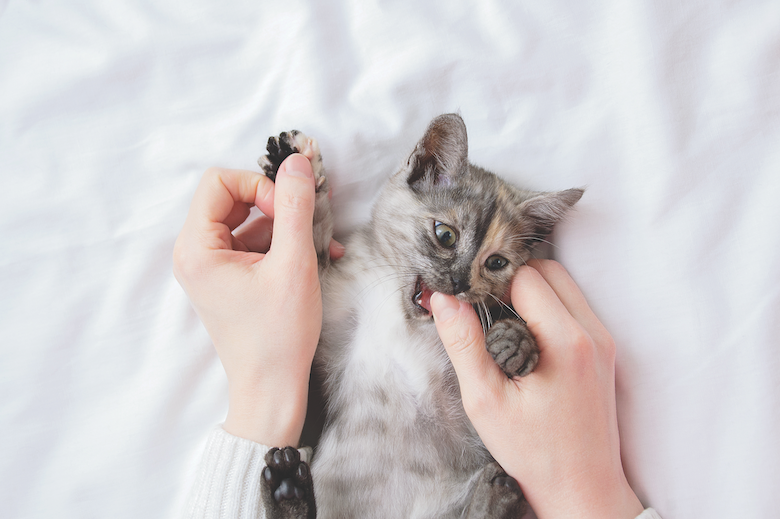
They’re as funny as they are cute, and that’s why so many of us love kittens. It’s also why more than 2 million cat videos on YouTube were viewed more than 25 billion times, according to an article published on theconversation.com last updated in 2018. No doubt these past couple of years have seen those numbers continue to climb.
If you recently adopted a kitten, expect loads of fun, laughter and surprises in one bundle of adorableness. Here are five quirky but common kitten behaviors that may puzzle you or make you laugh out loud.

Photo: VeraOsco; Mariia Skovpen | Getty Images
Kittens nurse on average for their first eight to 10 weeks of life. In their first 12 weeks, they learn valuable social skills from their moms and littermates. If they are separated from their feline family too soon, they might exhibit some insecurities. One such behavior is sucking on blankets, wool or some type of favorite cloth. This behavior provides comfort and is reminiscent of feeling safe with Mom while nursing.
If you notice the behavior excessively, this could also be a sign of stress, as the kitten tries to recreate those feelings of familiarity and comfort. What can you do?

Photo: cynoclub | Getty Image
Play is vital for cats and kittens. Playing with their littermates hones their hunting skills, which they need to catch prey in the wild. Their first playmates are their littermates. They chase, roughhouse and wrestle with each other, usually taking turns chasing and switching off top and bottom positions.
At times it may be difficult to distinguish whether they are playing or fighting for real. How can you tell? A real catfight:
Kneading is another comfort behavior left over from nursing. Often called making biscuits because they look like they’re kneading bread dough, kittens engage in this behavior to stimulate milk flow from their mothers.
Adult cats:

Photo: Lightspruch | Getty Image
Cats are particular about their bathrooms and prefer a clean space. They instinctively bury their waste to keep predators and prey from picking up on their scent. When they see their moms using the litter box or if you place them in one, kittens catch on pretty quickly.
Kittens may like their litter boxes so much that they play or even sleep in them. It’s normal for kittens to spend extra time digging and even playing in their litter. Because the scent glands in their paw pads provide a recognizable smell, they may feel safe enough to fall asleep on their litter. Make sure:
It’s instinctive for kittens to bite and paw at anything that moves, including your fingers and toes. Although it may be cute, you don’t want this behavior to continue into adulthood. Always:
When it comes to raising a well-behaved kitten, remember that whatever you reward — whether intentionally or unintentionally — gets repeated. Provide plenty of playtime to redirect any unwanted behaviors and safe spaces to help kitty feel secure.
Featured image: Juliia Alekseeva | Getty Images
Read Next: Basic Litter Training for Kittens